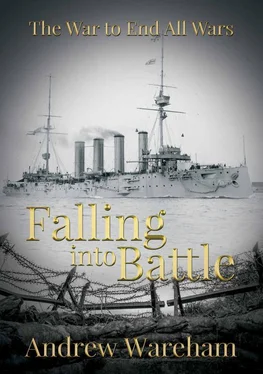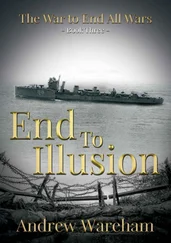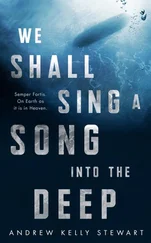“All calculations done in the head, Mr Harker?”
“Yep! How’s your arithmetic, Sub?”
“About to get a lot better, I hope. What’s the minimum range you can fire at? There’s a safety cap on the torpedo, is there not?”
“Say four hundred yards, unless you know what you are doing. It’s a little propeller that unwinds in the water. If you have a sense of humour, you can partly unwind it while it’s still in the tube. Make a mistake and it may go off on hitting the water.”
“Let’s just say four hundred yards, Mr Harker. Two cables is as close as we want to get anyway.”
“I agree. It’s wiser. It’s a matter of by guess and by God, aiming a torpedo. You don’t have time enough to be completely scientific – you just hope your eye’s in. If we get the chance and time enough at practice, I’ll let you try a couple.”
They practised and their dummy heads hit the targets on occasion. Simon fired twice and scored a hit, to his delight and the amazement of Mr Harker.
“How did you do that, Sub? That bloody cruiser was winding up to full speed and you hit her square in engineroom.”
“It was because he was so fast, Mr Harker. He couldn’t turn away in time, he was committed to his line. I think. I could see where he was going to be in three minutes.”
“More than I could, young man. Well done!”
Harker made sure that Captain Smallwood knew that the hit was Simon’s, that he had made the score on his own, unaided.
“Well done. Both of you, gentlemen!”
The flotilla steamed south and then west to Portsmouth and joined the Fleet for the summer manoeuvres. The destroyer, tiny at less than a thousand tons, was dwarfed by the battle fleet and the battlecruisers that joined it.
“Huge ships, sir.”
Captain Smallwood was inclined to be amused at Simon’s reaction.
“Love to put a torpedo into one of them, Sub?”
“A pair of them, sir. Right up from behind! They wouldn’t be so proud with their screws and rudders blown off! Crippled in the water and waiting for the coup de grace. Brings the submarines back into the equation, sir. Can a battle fleet live with half a dozen little submarines waiting for it to pass by?”
“What a vile thought, Sub! No. You’re right, but they look handsome enough. That’s Iron Duke with Jellicoe’s flag. Magnificent ship. Just out of the yard, working up still but looks everything a flagship should be. You will note the six inch batteries – the superdreadnoughts are no longer all big-gun ships, though she has ten of thirteen point fives as her main armament. The six inch are a reaction to the torpedo boat, Sub – purely defensive in nature. Useless against the submarine, of course.”
“Can anything defend against the submarine, sir?”
“Minefields? Flotillas of small craft with hydrophones and a depth bomb ship to be called up by wireless if they hear anything? Airships to patrol great expanses of sea and keep them submerged and slow? Torpedo nets in harbour? All suggestions that have been made in the last year. You pays your money and you takes your choice, like the showman said. There is a defence to every weapon, provided one can find it in time. A hot war will soon bring some sort of answer.”
Christopher Adams was glad to be at sea at last. It was interesting, and good professional experience, to be present in the last few months of commissioning a great ship, but it involved a deal of tedious labour. Every day there were lists to check, installations to inspect, stores literally to count – every pen and pencil in the chartroom was listed and had to be certified as present, together with bottles of ink and erasers.
He was a navigation specialist, or was to become one, and he had spent hours in the chartroom correcting the newly delivered charts for magnetic variation and entering the latest in soundings, buoys and lights reported from the Hydrographer’s Office. Normally, the reports came in whenever they docked and there would be a few charts to modify. On a new ship, charts for every mile of all of the world’s oceans, printed over the last five years, would be delivered and must all be made up to date with the corrections issued in the past half decade before sailing day. Iron Duke must be capable of sailing to any port in the world, of traversing every ocean and sea – and that demanded that every chart must be precise. It was hard, detailed work and naturally fell to the most junior officer, assisted by a pair of midshipmen whose work must be double-checked – by the sublieutenant. A single error could wreck the ship one day – mistakes would do his career no good at all.
On top of his specialist labour, he had to stand his watches, which were no great responsibility with the ship still at the quayside. He had, however, to be turned out to flagship standards at all times, dressed in best doeskins, the finest of all cloths used for uniforms, and spotless. It was hard to keep a shirt perfectly white for four hours in a ship inhabited by greasy-handed dockyard mateys; it was essential that it should be achieved. The watchkeepers were visible to the admiral and his staff and were the obvious targets for his demands to achieve the standards he desired of his flagship.
It was part of the existence Christopher wanted for himself. Service on a flagship had its drawbacks but it was the golden route to promotion. A sublieutenant who excelled – the alternative was to fail, there was no middle ground – would be a full lieutenant inside the year and would then have every chance to achieve lieutenant commander in the minimum of seven years demanded in peacetime service. In a war, that period could be cut drastically, for the man who shone. More than one lieutenant had risen to full commander in three years on the China Station, where there was a permanent state of action. Almost all of those who had made such a meteoric climb had done so under the eye of their admiral.
The war that was coming was expected to last for six months, at most. The Navy would spend that time chasing down the German High Seas Fleet and bringing it to a battle greater than Trafalgar, and just as climactic. A young lieutenant must come out of that triumph with his promotions – provided he was efficient, bold and above all, visible.
Christopher did all that was demanded of him, and a little more every time. He did not make a vulgar display of his prowess but ensured that it was quietly known. Already it was the case that if a task was more complex, more demanding than most, it should be given to him – he would get it right.
He found his bunk in a state of near exhaustion every night, which was as it should be for a junior officer.
Off duty, he was to be seen in the wardroom, courteously socialising, never noisy or in the slightest degree tipsy, always present if there were guests and entertaining the most tedious in the politest fashion. He was not well-loved by his peers, but he was respected and recognised – he was the brightest star of their constellation.
He stood on the bridge, properly to the wings, out of the way but immediately to hand, as Iron Duke steamed to her place at the head of the fleet, the admiral inspecting every ship they passed.
“What are those destroyers?”
The captain answered.
“The new H class, sir.”
“Got them, renamed last year. Is that the Harwich flotilla?”
There was silence. Christopher put his glasses on the flotilla.
“Beg pardon, sir. That is Sheldrake third in line – I was on St Vincent with her sub and I see him on her bridge. She is a Harwich ship.”
Sheldrake was making twenty knots, her stem obscured in a cloud of spray, stern buried deep with the wake making it impossible to read her name. The wind was whipping her pennants.
Читать дальше












